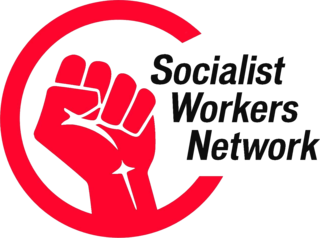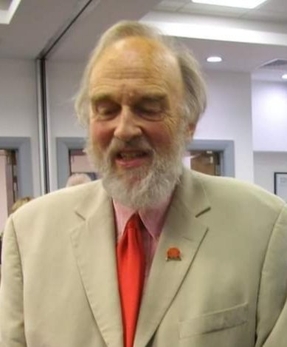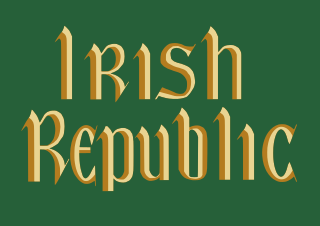
Left-wing politics describes the range of political ideologies that support and seek to achieve social equality and egalitarianism, often in opposition to social hierarchy. Left-wing politics typically involve a concern for those in society whom its adherents perceive as disadvantaged relative to others as well as a belief that there are unjustified inequalities that need to be reduced or abolished. According to emeritus professor of economics Barry Clark, supporters of left-wing politics "claim that human development flourishes when individuals engage in cooperative, mutually respectful relations that can thrive only when excessive differences in status, power, and wealth are eliminated."

Trotskyism is the political ideology and branch of Marxism developed by Russian revolutionary Leon Trotsky and some other members of the Left Opposition and Fourth International. Trotsky described himself as an orthodox Marxist, a revolutionary Marxist, and a Bolshevik–Leninist as well as a follower of Marx, Engels, Vladimir Lenin, Karl Liebknecht, and Rosa Luxemburg. He supported founding a vanguard party of the proletariat, proletarian internationalism, and a dictatorship of the proletariat based on working-class self-emancipation and mass democracy. Trotskyists are critical of Stalinism as they oppose Joseph Stalin's theory of socialism in one country in favour of Trotsky's theory of permanent revolution. Trotskyists criticize the bureaucracy and anti-democratic current developed in the Soviet Union under Stalin.
Shachtmanism is the form of Marxism associated with Max Shachtman (1904–1972). It has two major components: a bureaucratic collectivist analysis of the Soviet Union and a third camp approach to world politics. Shachtmanites believe that the Stalinist rulers of proclaimed socialist countries are a new ruling class distinct from the workers and reject Trotsky's description of Stalinist Russia as a "degenerated workers' state".

Socialism in New Zealand had little traction in early colonial New Zealand but developed as a political movement around the beginning of the 20th century. Much of socialism's early growth was found in the labour movement.

The Communist Party of Ireland is an all-Ireland Marxist–Leninist communist party, founded in 1933 and re-founded in 1970. It rarely contests elections and has never had electoral success. The party is a member of the International Meeting of Communist and Workers' Parties.
People's Democracy was a political organisation that arose from the Northern Ireland civil rights movement. It held that civil rights could be achieved only by the establishment of a socialist republic for all of Ireland. It demanded more radical reforms of the government of Northern Ireland than the Northern Ireland Civil Rights Association.
A political international is a transnational organization of political parties having similar ideology or political orientation. The international works together on points of agreement to co-ordinate activity.

Revolutionary Marxist Group was a Trotskyist organisation in Ireland during the 1970s.
Politics is the process by which groups of people make decisions. Although the term is generally applied to behavior within civil governments, politics is observed in all human group interactions, including corporate, academic, and religious institutions. Politics consists of "social relations involving authority or power. The definition of "politics" from "The Free Dictionary" is the study of political behavior and examines the acquisition and application of power. Politics study include political philosophy, which seeks a rationale for politics and an ethic of public behavior, and public administration, which examines the practices of governance.

The Socialist Workers Network (SWN) is an Irish Trotskyist organisation.

Left-wing populism, also called social populism, is a political ideology that combines left-wing politics with populist rhetoric and themes. Its rhetoric often consists of anti-elitism, opposition to the Establishment, and speaking for the "common people". Recurring themes for left-wing populists include economic democracy, social justice, and scepticism of globalization. Socialist theory plays a lesser role than in traditional left-wing ideologies.
The American Left can refer to multiple concepts. It is sometimes used as a shorthand for groups aligned with the Democratic Party. At others, it refers to groups that have sought egalitarian changes in the economic, political, and cultural institutions of the United States. Various subgroups with a national scope are active. Liberals and progressives believe that equality can be accommodated into existing capitalist structures, but they differ in their criticism of capitalism and on the extent of reform and the welfare state. Anarchists, communists, and socialists with international imperatives are also present within this macro-movement. Many communes and egalitarian communities have existed in the United States as a sub-category of the broader intentional community movement, some of which were based on utopian socialist ideals. The left has been involved in both the Democratic and Republican parties at different times, having originated in the Democratic-Republican Party as opposed to the Federalist Party.
The influences of socialism and socialist movements in Pakistan have taken many different forms as a counterpart to political conservatism, from the groups like The Struggle, Lal Salam which is the Pakistani section of the International Marxist Tendency, to the Stalinist group like Communist Party through to the reformist electoral project enshrined in the birth of the Pakistan Peoples Party (PPP) and Pakistan Tehreek-e-Insaf (PTI).
Socialism in Australia dates back at least as far as the late-19th century. Notions of socialism in Australia have taken many different forms including utopian nationalism in the style of Edward Bellamy, the democratic socialist reformist electoral project of the early Australian Labor Party (ALP), and the revolutionary Marxism of parties such as the Communist Party of Australia.
The Irish Marxist Society was a Eurocommunist organisation active in Ireland in the 1970s.
Socialism in Greece has a significant history, with various activists, politicians and political parties identifying as socialist. Socialist movements in Greece began to form around the early 20th century, including the Communist Party of Greece (KKE) (1920–present), the Socialist Party of Greece (1920-1953) and the Panhellenic Socialist Movement (PASOK). Socialist ideology is present within the political party Syriza which forms the current opposition in Greece, also known as the Coalition of the Radical Left.

Daniel Rayner O’Connor Lysaght, commonly known as D.R. O’Connor Lysaght and informally known as Rayner was a Welsh-born Irish revolutionary Marxist, a historian and an author.

Peter Graham was an Irish republican and Marxist who worked as an electrician.









